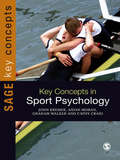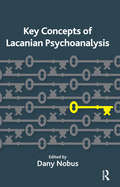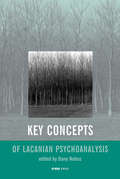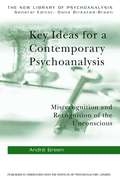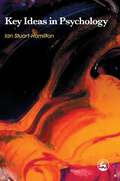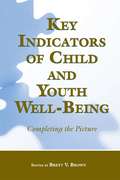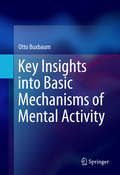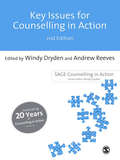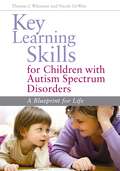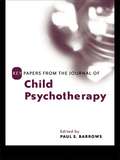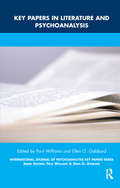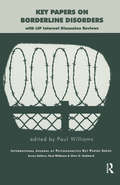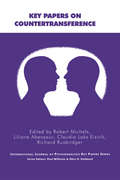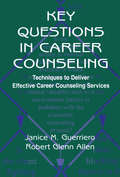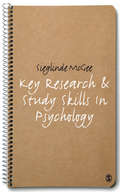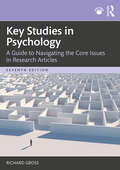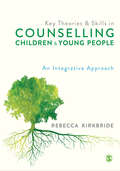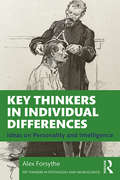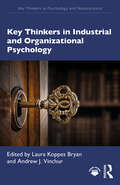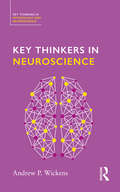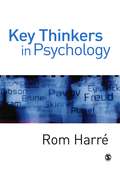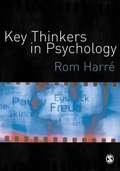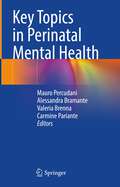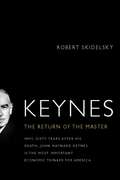- Table View
- List View
Key Concepts in Sport Psychology (SAGE Key Concepts series)
by Graham Walker Aidan Moran Dr John M Kremer Cathy CraigThis book provides a focused, accurate guide for students working within the dynamic field of sport psychology. The concise and authoritative entries have been selected by experienced teachers and researchers; each one defines, explains and develops a key topic in sport psychology acting as a springboard for further reading and debate. This is a stimulating and practical resource for students defined by the clarity of writing and relevant examples. Each concept gives the student: * clear definitions * up-to-date suggestions for further reading * careful cross-referencing Easy to use and intelligently judged this book offers the modern student the basic materials, tools and guidance for planning essays and passing exams.
Key Concepts of Lacanian Psychoanalysis
by Dany NobusIn this classic work, eight crucial Lacanian ideas are explained through detailed exploration of the theoretical and/or practical context in which Lacan introduced them, the way in which they developed throughout his works, and the questions they were designed to answer. The book does not presuppose any familiarity with Lacanian theory on the part of the reader, nor a prior acquaintance with Lacan's Ecrits or seminars. Originally published in 1998, the ideas within are more relevant than ever and this newly reissued volume will prove invaluable to today's scholars of Lacanian thought.
Key Concepts of Lacanian Psychoanalysis
by Dany Nobus"By detailing the constitutive incompletion of the Lacanian project, the contributors have guaranteed the success of their book, which will remain a major reference for a long time to come."-Joan Copjec
Key Ideas for a Contemporary Psychoanalysis: Misrecognition and Recognition of the Unconscious (The New Library of Psychoanalysis)
by Andre GreenAndré Green attempts the complex task of identifying and examining the key ideas for a contemporary psychoanalytic practice. This undertaking is motivated both by the need for an outline of the evolution of psychoanalysis since Freud's death, and by the hope of tackling the fragmentation which has led to the current 'crisis of psychoanalysis'. In three sections covering the theoretical and practical aspects of psychoanalysis, and analysing the current state of the field, André Green provides a stimulating overview of the principal concepts that have guided his work. Subjects covered include: Transference and countertransference Psychoanalysis and Psychotherapy: modalities and results Language-speech-discourse in psychoanalysis Recognition of the unconscious This unique contemporary perspective on the psychoanalytic enterprise will fascinate all those with an interest in the problems that face the field and the opportunities for its future development.
Key Ideas in Psychology
by Ian Stuart-HamiltonThis accessible book has a simple aim - to tell people what psychology is about. It presents a review of the key areas of the subject as it is traditionally taught, and provides the reader with an introduction to important concepts and findings within each of these. Armed with the information in this book, the reader should be able at least to make sense of most psychological topics. At the end of each chapter is a set of suggested further readings which will enable a more detailed exploration of the particular topic under discussion to be made. The book will be of interest to two groups of readers. The first comprises people who are new to the subject and simply want to know what psychology is. The second consists of those who want a general guide to an area but who wish to make up their minds on the details for themselves. Hence the basic information and arguments are explained, but details are not elaborated.
Key Indicators of Child and Youth Well-Being: Completing the Picture
by Brett V. BrownIndicators of child and youth well-being are indispensable tools for improving the lives of children. In this book, the nation‘s leading development researchers review the recent progress made in the measurement, collection, dissemination, and use of indicators of child and youth well-being. In addition, they identify opportunities for future
Key Insights into Basic Mechanisms of Mental Activity
by Otto BuxbaumA more nuanced perspective on cognition, behavior,personality, and pathology. Mind/brain. It is explained that mental activity is not possible withoutconcepts/memory structures that exist in the brain and result from perceptuallearning. Core mental activities including thinking, reasoning, and judgmentare described as components of self-regulation and in terms of interactingneural systems. This framework also leads to a more specific and lessstigmatizing system for classifying and diagnosing mental illnesses. This concise volume: Introduces the S-O-R (stimulus-organism-response) model of mental activity. Recasts mental processes as neuro-mental processes. Provides empirical evidence for the neural basis for judgments. Addresses ongoing mind/brain questions such as whether thinking is unconscious. Key Insights into Basic of Mental Activity will interest scientists doingresearch in psychology, psychiatry, psychotherapy, human biology/anthropology,linguistics, and neuroscience. Professors, lecturers, and instructors will findit important as a class text in these fields. And the book's clinicalimplications make it useful to practitioners of psychology, psychiatry, andpsychotherapy.
Key Issues for Counselling in Action (Counselling in Action)
by Windy Dryden Dr Andrew ReevesSAGE celebrated the 20th Anniversary of the Counselling in Action in November 2008. To view the video - click here ------------------------------------------------------ Effective counselling is based on a strong working relationship between counsellor and client. Building and maintaining this therapeutic alliance, demands both skill and an ability to negotiate challenges which arise during the counselling process. Key Issues for Counselling in Action prepares new practitioners for face-to-face work with clients by looking at what is required at each stage of the process and examining issues which practitioners most frequently need to deal with along the way. The topics covered are relevant to all counsellors, regardless of theoretical orientation. The book explores the everyday issues counsellors face when: - getting started - making an assessment - working at relational depth - setting goals, and - ending the relationship Advice is also given on more difficult challenges, such as dealing with: - reluctant clients - stuckness - client dependency, and - unplanned endings. Key Issues for Counselling in Action is a bestselling text which has been used to train many thousands of counsellors as well as supporting their continuing professional development. This second edition has been completely re-written and includes new material on the use of touch, self-care, culture and counselling evaluation. Windy Dryden is Professor of Psychotherapeutic Studies, Professional and Community Education (PACE) at Goldsmiths College, University of London. Andrew Reeves is a University Counsellor at the University of Liverpool Counselling Service and Editor of the journal, Counselling & Psychotherapy Research.
Key Learning Skills for Children with Autism Spectrum Disorders
by Thomas L. Whitman Nicole Dewittxx
Key Papers from the Journal of Child Psychotherapy
by Paul S. BarrowsThe practice of child psychotherapy builds upon the writings and contributions of earlier writers, such that it is not only the latest research and theory that are valuable. Key Papers from the Journal of Child Psychotherapy provides access to classic and important papers from the early years of the Journal - papers that have previously been difficult to obtain. The papers are grouped thematically to cover the entire range of work represented in the journal: theoretical, clinical, applied. The papers, written by professionals at the forefront of their fields, cover areas including psychoanalytical metapsychology, work with deprived children, work with trauma, and how psychoanalytic thinking can be applied in the context of institutions for children. Chapters include:: : Anne Alvarez's Problems in the Use of the Countertransference : : Edna O'Shaughnessy's The Absent Object : : Gianna Henry's Doubly DeprivedKey Papers from the Journal of Child Psychotherapy presents in one accessible volume, essential papers for all those training and practising in child psychotherapy. It will be of great benefit to all professionals involved in direct work with children.
Key Papers in Literature and Psychoanalysis (The IJPA Key Papers Series)
by Paul Williams Glen O. GabbardThis book presents several essays from the International Journal of Psychoanalysis that explore overlaps of literary experience and psychoanalytic process, providing the reader with a substantive contribution that reflects the principal concerns of contemporary psychoanalysis.
Key Papers on Borderline Disorders: With IJP Internet Discussion Reviews (The IJPA Key Papers Series)
by Paul WilliamsThe International Journal of Psychoanalysis Key Papers Series brings together the most important psychoanalytic papers in the journal's eighty-year history in a series of accessible monographs. Approaching the IJP's intellectual resources from a variety of perspectives, the monographs highlight important domains of psychoanalytic enquiry.
Key Papers on Countertransference: IJP Education Section (The IJPA Key Papers Series)
by Paul Williams Glen O. Gabbard Liliane Abensour Richard Rusbridger Robert Michels Claudio Laks EizirikThe International Journal of Psychoanalysis Key Papers Series brings together the most important psychoanalytic papers in the journal's eighty-year history in a series of accessible monographs. Approaching the IJP's intellectual rsources from a variety of perspectives, the monographs highlight important domains of psychoanalytic enquirry. 'The papers in this volume were commissioned with a view to describing the current views of countertransference, and thier historical evolution, in four intellectual communities of psychoanalysis: North America, Britain, France and Latin America. 'Psychoanalysis is still sometimes described as a monolithic and unchanging theory and practice. These papers vividly contradict such a view through their close study of the evolution of the concept of countertransference from the periphery of psychoanalysis to its current position of central importance in most analytic communities. In doing so, they provide a window of the development of a living and evolving discipline during its first one hundred years.'- From the Introduction by Richard Rusbridger
Key Questions in Career Counseling: Techniques To Deliver Effective Career Counseling Services
by Robert G. Allen Janice M. GuerrieroThis book's purpose is to provide a tool for career services personnel to deliver more effective, consistent career counseling. Its primary objective is to present a career counseling process model, including sequential stages and steps, along with a method (the Key Questions Technique) for successfully implementing the model. It is intended to serve as the bridge between the theoretical and the applied worlds of career counseling, and it is hoped that this book will increase the standards of professionalism and objectivity for the many diverse practitioners who currently conduct career counseling in the workplace.
Key Research and Study Skills in Psychology
by Sieglinde McGeeI am happy to recommend this to my students as it covers jargon without using jargon and explains all those simple things that many academics take for granted. It also gives good examples of how to get the best from your time studying psychology from how to write good essays to the rules of writing lab reports′ - Dr Jay Coogan University of East London ′I am happy to recommend this to my students as it covers jargon without using jargon and explains all those simple things that many academics take for granted. It also gives good examples of how to get the best from your time studying psychology from how to write good essays to the rules of writing lab reports.′ Dr Joy Coogan, University of East London This book provides students with a wide range of research and study skills necessary for achieving a successful classification on a psychology degree course. It replaces the stress and fear experienced when encountering essays, reports, statistics and exams with a sense of confidence, enthusiasm and even fun. Sieglinde McGee presents indispensable instruction, advice and tips on note making and note taking, evaluating academic literature, writing critical essays, preparing for and doing essay and MCQ exams, understanding research methods and issues associated with conducting research, writing and presenting reports and research and also some important computer skills. Examples provided will show how to score well on assignments and exams and also the sort of approach, layout, errors, omissions or answer-style that would achieve a lower grade. Practical exercises and interactive tasks are integrated throughout to clarify key points and give the students a chance to practise on their own. This is a useful resource for students taking modules in study and research skills in psychology and an essential guide for all other students studying on psychology programmes. Dr Sieglinde McGee is an Associate of the School of Psychology at Trinity College, Dublin, where she taught for several years.
Key Studies in Psychology: A Guide to Navigating the Core Issues in Research Articles
by Richard GrossNow in its seventh edition, this book brings together 30 classic and contemporary studies in psychology to show students how to analyse key studies in the field, understand how classic theories are constantly revisited by modern researchers, and develop the skills required to write about psychology in exams and essays.Pulled from each of the five major areas of psychology – cognitive, developmental, individual differences, social, and biopsychology – the studies cover such topics as language and memory, attachment, mental disorder, bystander intervention, and near-death experiences. Each chapter looks at the background and context to a classic and contemporary study and provides a summary of them, before going on to evaluate areas of agreement and convergence, disagreement and divergence, and strengths and weaknesses. Each of these areas focuses on theoretical, methodological/statistical, and ethical issues. Finally, suggestions are made regarding applications, implications, and future research directions. In so doing, the book helps students learn how to deal with primary sources, including how to extract the most relevant information, assess strengths and weaknesses, know what to look for when evaluating a study, and understand how it relates to other research.Bridging the gap from A-level to degree level study, this is the ideal resource for undergraduate students in psychology.
Key Theories and Skills in Counselling Children and Young People: An Integrative Approach
by Rebecca KirkbrideThis book provides a highly accessible, skills focused entry point to the interventions, techniques, strategies, and core knowledge you need to work with children and young people. Divided into four parts, it covers: - Core Knowledge: Understanding Development from 0-18 years - Key Skills: The Therapeutic Process - Key Skills: Interventions, Techniques & Strategies - Key Considerations: Contexts & Client Groups Its bite sized entries include suggested additional resources to help you explore the topic further, and throughout the book you will find case studies and exercises to aid your understanding. This book is ideal for mental health and therapy trainees and practitioners who need a foundation in working with children and young people.
Key Theories and Skills in Counselling Children and Young People: An Integrative Approach
by Rebecca KirkbrideThis book provides a highly accessible, skills focused entry point to the interventions, techniques, strategies, and core knowledge you need to work with children and young people. Divided into four parts, it covers: - Core Knowledge: Understanding Development from 0-18 years - Key Skills: The Therapeutic Process - Key Skills: Interventions, Techniques & Strategies - Key Considerations: Contexts & Client Groups Its bite sized entries include suggested additional resources to help you explore the topic further, and throughout the book you will find case studies and exercises to aid your understanding. This book is ideal for mental health and therapy trainees and practitioners who need a foundation in working with children and young people.
Key Thinkers in Individual Differences: Ideas on Personality and Intelligence (Key Thinkers in Psychology and Neuroscience)
by Alex ForsytheKey Thinkers in Individual Differences introduces the life, work and thought of 25 of the most influential figures who have shaped and developed the measurement of intelligence and personality. Expanding on from a résumé of academic events, this book makes sense of these psychologists by bringing together not only their ideas but the social experiences, loves and losses that moulded them. By adapting a chronological approach, Forsythe presents the history and context behind these thinkers, ranging from the buffoonery and sheer genius of Charles Galton, the theatre of Hans Eysenck and John Phillipe Rushton, to the much-maligned and overlooked work of women such as Isabel Myers, Katherine Briggs and Karen Horney. Exploring all through a phenomenological lens, the background, interconnections, controversies and conversations of these thinkers are uncovered. This informative guide is essential reading to anyone who studies, works in or is simply captivated by the field of individual differences, personality and intelligence. An invaluable resource for all students of individual differences and the history of psychology.
Key Thinkers in Industrial and Organizational Psychology (Key Thinkers in Psychology and Neuroscience)
by Andrew J. Vinchur Laura Koppes BryanKey Thinkers in Industrial and Organizational Psychology explores the lives, ideas, contributions, and impact of key figures who have shaped and developed industrial and organizational (I-O) psychology.Through a chronological lens, the book traces the history and context behind the groundbreaking work of a diverse group of individuals who have influenced the field. Among those featured are pioneers such as Walter Dill Scott, Charles S. Myers, Lillian Evelyn Moller Gilbreth, Francizka Baumgarten-Tramer, Chen Li, and Bernard M. Bass. The book offers the reader a comprehensive understanding of the evolving ideas and discoveries that have shaped I-O research and practice over time.This book is an invaluable resource for all scientists and practitioners of I-O psychology and historians of psychology, as well as anyone interested in how psychology has transformed workplaces and influenced organizational practices.
Key Thinkers in Neuroscience
by Andy WickensKey Thinkers in Neuroscience provides insight into the life and work of some of the most significant minds that have shaped the field. Studies of the human brain have been varied and complex, and the field is rich in pioneers whose endeavours have broken new ground in neuroscience. Adopting a chronological and multi-disciplinary approach to each Key Thinker, the book highlights their extraordinary contributions to neuroscience. Beginning with Santiago Ramon y Cajal and finishing with the philosophers Patricia Churchland and Paul Churchland, this book provides a comprehensive look at the new ideas and discoveries that have shaped neuroscientific research and practice, and the people that have been invaluable to this field. This book will be an indispensable companion for all students of neuroscience and the history of psychology, as well as anyone interested in how we have built our knowledge of the brain.
Key Thinkers in Psychology
by Rom Harre`For anyone that has spent years rowing off into convoluted estuaries, and would like an entertaining and useful chart to remind them of River Psychology as a whole, I thoroughly recommend this book′ - The Psychologist `This is a highly enjoyable, erudite and beautifully written manuscript. It conveys a rare depth of understanding and ability to strike at the core debates. The lively style, concentration on the biopic, use of text features such as links between names, and formal division of each sub-section will all appeal.… I have taught History of Psychology for nearly 6 years. This text will prove for more palatable to students than any of the competitors′ - Dr Steve Brown, Loughborough University `This book is well-written. It is clever, flowing and engaging. The balance between biography and contribution is excellent and makes it almost un-put-downable′ - Professor Adrian Furnham, University College London The 20th Century was rich in attempts to characterize and explain psychological phenomena and so to understand the human mind. These projects were undertaken by a huge and diverse list of characters from B F Skinner to James Gibson, from Gordon Allport to Hans Eysenck. It is important for every student of psychology, wherever they might be in the world, to understand the classic scholars, the classic studies, and the subsequent generations of people and ideas that have come to define the broad discipline that is `psychology′. This book achieves this in the most accessible and engaging manner possible. Rom Harré presents a unique textbook orientation, combining the biopic with the significance of the major protagonists of the last century, organized by `schools of thought′, yet with cross-references throughout the text.
Key Thinkers in Psychology
by Rom HarréIt is important for every student of psychology, wherever they might be in the world, to understand the classic scholars, the classic studies, and the subsequent generations of people and ideas that have come to define the broad discipline that is 'psychology'. This book achieves this in the most accessible and engaging manner possible. Rom Harré presents a unique textbook orientation, combining the biopic with the significance of the major protagonists of the last century, organized by 'schools of thought', yet with cross-references throughout the text.
Key Topics in Perinatal Mental Health
by Mauro Percudani Alessandra Bramante Valeria Brenna Carmine ParianteThe book offers a comprehensive and up-to-date overview of key issues in perinatal mental health. Classic topics such as screening, assessment, pharmacological, psychological and psychosocial interventions of the most common conditions (depression, anxiety disorders, etc.) are combined with lesser known issues, such as mother-infant relationship disorders or thoughts of infant-related harm and aggressive behaviors, sleep disturbances in puerperium, obsessional disorders, fetal death etc., paying particular attention to specific groups of perinatal patients like mothers with cancer, adolescents, fathers, migrants, and preterm babies. The chapters written by health professionals working in hospitals, community services or voluntary agencies alternate with contributions from researchers whose fields of expertise include biology and neuroscience, diagnosis and special needs, treatment and prognosis, etc., striking a balance between scientific investigation and clinical practice.The book offers a valuable tool for a wide range of professionals like psychiatrists, psychologists, gynecologists, midwives, oncologists, pediatricians, and social workers, who want to improve their clinical practice and the effectiveness of their treatment pathways using evidence from perinatal health research.
Keynes
by Robert SkidelskyThe ideas of John Maynard Keynes have never been more timely. No one has bettered Keynes's description of the psychology of investors during a financial crisis: OCyThe practice of calmness and immobility, of certainty and security, suddenly breaks down. New fears and hopes will, without warning, take charge of human conductOC the market will be subject to waves of optimistic and pessimistic sentiment. ' Keynes's preeminent biographer, Robert Skidelsky, Emeritus Professor of Political Economy at the University of Warwick, brilliantly synthesizes from Keynes's career and life the aspects of his thinking that apply most directly to the world we currently live in. In so doing, Skidelsky shows that Keynes's mixture of pragmatism and realism OCo which distinguished his thinking from the neo-classical or Chicago school of economics that has been the dominant influence since the Thatcher-Reagan era and which made possible the raw market capitalism that created the current global financial crisis OCo is more pertinent and applicable than ever. Crucially Keynes offers nervous capitalists OCo and Keynes never wavered in his belief in the capitalist system OCo a positive answer to the question we now face: When unbridled capitalism falters, is there an alternative? In the long run, as Keynes famously said, we are all dead. We may not have time to wait for the perfect theoretical operation of capital as the neo-classicists insist will happen eventually. In the meantime, we have Keynes: more supple, more human and more magnificently real than ever.
